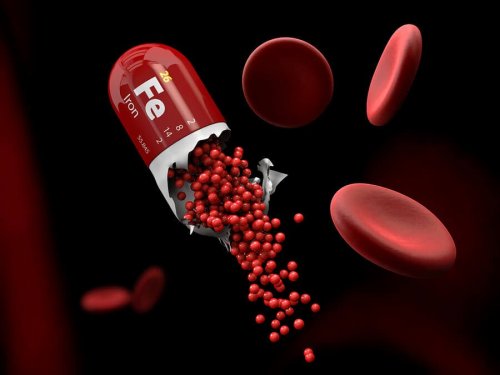High Ferritin: How to Reduce It


Written and verified by the doctor Leonardo Biolatto
Ferritin is one of the proteins that influence the metabolizing of iron. It’s in charge of storing it in certain cells in your body so that, when it’s needed, you have it stored up. Having high ferritin in your blood can be a sign that something isn’t right in your body.
Most ferritin is found in your liver. However, there is an amount that circulates through your blood. Therefore, when you measure the amount of ferritin in your blood, you can also estimate the concentration of iron in your body. Iron is essential for the hemoglobin of red blood cells to be able to join with the oxygen and transport it to all your cells.
In this article we’ll explain what happens when you have high ferritin levels in your blood and how to lower it.
What does it mean to have high ferritin?
As we mentioned, ferritin is a protein that allows you to store iron in your cells. When we measure its concentration in the blood, we can know if your iron reserves are high, low, or in the normal range.
Normally, blood ferritin levels should be between 12 and 300 nanograms/milliliter in men. For women, the normal level is between 12 and 150 ng/mL. This difference is because women, with menstruation, lose a notable amount of iron.

- Drinking alcohol frequently or excessively.
- Inflammatory processes. These can be caused by many illnesses, like cancer.
- A very iron-rich diet.
- Anemia. This cause is complex. When it has an iron deficit, the body may try to fix it by increasing the amount of ferritin in circulation and, therefore, the available iron.
- Blood transfusions.
- Macrophage activation syndrome. This is a condition in which some immune cells, called macrophages, are more active than normal. They are cells that also store ferritin.
- Finally, we can’t forget that having high ferritin also depends on genetic factors. In fact, there’s a hereditary disease, called hemochromatosis, which is just when there is an excessive accumulation of iron.
You might like: Anemia and Iron Deficiency: Are They the Same?
What symptoms can you have?
Generally, people are asymptomatic at the beginning, but after a time some symptoms can appear. First, it’s common for the person to feel tired and weak.
It’s also common for a person with high ferritin to feel abdominal or joint pain. Their skin may get darker. They may even have heart problems as a consequence.

You might be interested in: Treat Iron Deficiency Anemia with 5 Natural Remedies
How do you treat high ferritin?
First, it’s crucial that you see a doctor.
Certain treatment options can lower your ferritin levels. First, you should try to reduce your consumption of iron-rich foods like spinach, liver, and red meat.
Additionally, doctors often recommend you eat sources of chelates. Chelates are substances that join to metals they find in the blood, like iron, and let you eliminate them.
Finally, you may need to get a phlebotomy. A phlebotomy is a procedure that consists of extracting blood from the person with high ferritin. You may have to do it several times to lower your ferritin levels. Additionally, you need frequent blood analyses to test it.
It’s important to remember that you should see your doctor relatively often and get blood tests. Through this simple measure you can learn many important things about your health, like your ferritin level.
All cited sources were thoroughly reviewed by our team to ensure their quality, reliability, currency, and validity. The bibliography of this article was considered reliable and of academic or scientific accuracy.
- ¿Cómo interpretar los aumentos de la ferritina sérica? – Artículos – IntraMed. (n.d.). Retrieved April 23, 2020, from https://www.intramed.net/contenidover.asp?contenidoid=87426
- Koperdanova, M., & Cullis, J. O. (2015). Interpreting raised serum ferritin levels. BMJ (Online), 351. https://doi.org/10.1136/bmj.h3692
- Qué significa tener la ferritina alta y cómo bajarla. (n.d.). Retrieved April 23, 2020, from https://blog.saludonnet.com/que-significa-tener-la-ferritina-alta-y-como-bajarla/
- Ferritina Alta, ¿Cómo bajarla? – Hospital Fuensanta Madrid. (n.d.). Retrieved April 23, 2020, from https://hospitalfuensanta.com/especialidades/analisis-clinicos/ferritina-alta-como-bajarla/
This text is provided for informational purposes only and does not replace consultation with a professional. If in doubt, consult your specialist.








